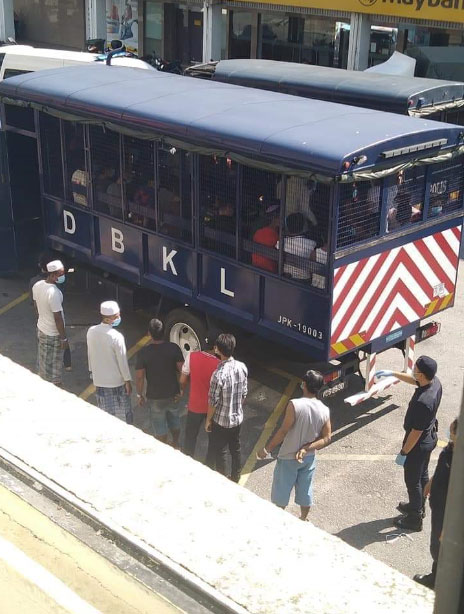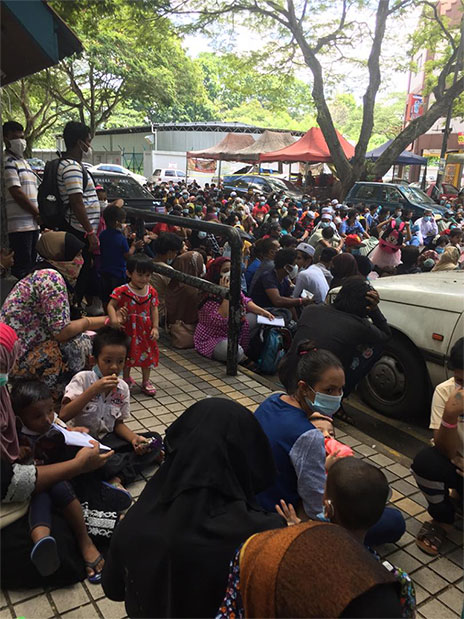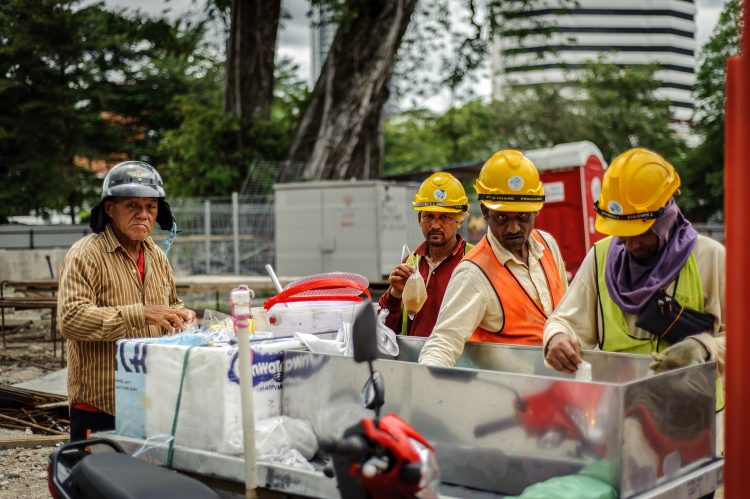 Food And Rights Talk is a series of interviews with PAN Asia Pacific (PANAP) partners across the globe to find out the situation of rural peoples, in relation to food security and human rights, amid the COVID-19 pandemic.
Food And Rights Talk is a series of interviews with PAN Asia Pacific (PANAP) partners across the globe to find out the situation of rural peoples, in relation to food security and human rights, amid the COVID-19 pandemic.
This week, we talk with Glorene Das, executive director of Tenaganita, an organisation protecting and promoting the rights of women, migrants and refugees in Malaysia.
PAN Asia Pacific (PANAP): Can you describe the plight of migrant workers in Malaysia during the COVID-19 pandemic? Are their basic rights to food and health care being met?
Glorene Das: There are about 2.2 million documented workers in Malaysia and though the numbers have never been confirmed there are about 4 million undocumented persons. It includes asylum seekers and stateless workers, otherwise known as “illegals” in our law. These are the groups of people who are seen as national security threats, as enemies to be flushed out. With the restrictions on movement since March 18, communities of migrants have been pushed really close to the edge. Their access to food, water, and health care is so uncertain, what more with so many of them without work and wages. Some of them told us that they haven’t been paid since February because of the lockdown. The Movement Control Order (MCO) has taken away their only source of survival in Malaysia. In fact, if you speak to many of them, they will tell you that they are more afraid of starvation and being thrown away from their houses for not being able to pay the rent rather the virus itself. With most workplaces closed and activities suspended, migrants living in cramped, closed quarters are beginning to feel the pangs of hunger as their money is running out. And I quote some of them, “We eat bread and rice, but we haven’t had vegetables or meat in a while.” There is massive food insecurity that exists among migrant workers who need immediate aid.
PANAP: What is your reaction to the arrests of hundreds of undocumented migrant workers in Kuala Lumpur last May? Are these arrests ongoing?
Glorene: Yes, the raids and arrests of migrant workers are still ongoing, but they are not being reported (as in the arrests last May). We are getting news of arrests now and then, across various locations throughout Malaysia, and we strongly denounce these operations as inhumane and cruel. While we acknowledge the presence of millions of undocumented workers in Malaysia as an issue, it should be addressed in a more comprehensive and transparent approach. This is not the time to address this issue, when we have a serious pandemic that’s threatening our lives. Because of these raids, more fear is being instilled in the communities of migrant workers, deterring them from coming forward to be tested for COVID-19 and to seek further treatment, therefore regressing efforts by the Health Ministry to curb this virus. So we really hope that the government will stop and halt these arrests, otherwise it will look like the government is responsible for putting 30 million Malaysians at risk. Despite the many warnings we have given to the government from the beginning that there has to be immediate repatriation of those in detention camps and that the refugees need to be released to the UNHCR, they didn’t take us seriously. Today, we have more than 300 cases within just a couple of detention camps. These detention camps have become a hotbed of the spread of the virus, and this is of great concern to us. We’re just talking about two detention camps, and in Malaysia we have a lot. We have not been informed if tests and screening are taking place in these camps. Because there’s an outcry by the general public, human rights groups, and health activists—stating that there should not be anybody in the detention camps at this point, there has been a decrease in cases of late. But we also question if the statistics being shared are correct, or if possibly that’s just a government strategy to keep us quiet and not to make any more demands.

Glorene: To curb what it calls “illegals,” there was a Malaysian Action Plan introduced by the former government, headed by the current Prime Minister. One of the main points is to make the situation really demeaning and difficult for migrants to stay on, to the point that they will surrender themselves to be deported. Unfortunately, after many attempts there still remains a lot of undocumented workers. This is an ideal situation for them to “kill two birds with one stone,” so to speak. They used the pandemic as a way to simply flush out the “illegals.” Now why are they doing this? Let’s go to how one becomes undocumented. There are many reasons. The refugees who have fled from their countries because of persecution, war and conflict. But there are also migrant workers who went into the country using the regular channel, they’ve got passports and visas but because of the system, the corruption that takes place and unscrupulous agents and employers who failed to renew their work permits, they have become undocumented. In the past couple of years the government did introduce this re-hiring program. Many of them—700,000 workers—paid an amount of 6,000 MYR each to be re-legalized. But only 110,000 workers were given the permit and the rest of them are still lingering, and are the ones being arrested. We see a pattern over the years. There is not much profit to be made through the re-hiring program. Because once all these undocumented workers have been deported and blacklisted, in a year or two they will bring more than 1.5 million workers from Bangladesh, India, Nepal, and other countries. There’s more profit there in comparison to the re-legalization programs because these will be new workers—which means they can be more exploited compared to the ones who have been in this country for five to 10 years, who are a little bit more assertive. At the end of the day, it’s all about exploitation.
PANAP: What are situation in these detention camps?
Glorene: The information we have received are from workers who have been arrested, released or deported from detention camps, and from another group of NGOs who give health services once a month. Based on the data, it’s very clear that these camps don’t have the right facilities to curb the virus. I just got a message from a nurse who has been in the camp, saying that there is a great need for masks, clothes and sanitizers. We’ve long been saying that the camps must be monitored by independent bodies but this has not been allowed for the longest time. It is really worrying, what are the health services and standard operating procedures (SOPs) in place? Who is monitoring? Those are the questions that we continue to ask.
PANAP: In other countries, migrant workers face discrimination because of misconceptions that they are “carriers” of the virus. Is it the same in Malaysia?
Glorene: I would say so, based on the tremendous slandering we have received the past month from politicians and populists. Social media is filled with xenophobic and violent hatred along with demands that these migrants “go back to where they come from.” Some of these xenophobic campaigns have included having our names and photographs circulated along with accusations. This has injected further fear in communities which are already struggling with food and shelter during his lockdown. Quite frankly, there are a lot of misconceptions surrounding the undocumented among the general public in Malaysia. We are continuously discrediting these with facts and evidence that we have collected throughout the years. The thing is, undocumented migrant workers and refugees have become the convenient whipping boy to blame for the pandemic. But migrants had nothing to do with COVID-19. In fact, we gave them COVID-19. Like the 19 migrant workers who were deported to Myanmar. They were positive but where would they have contracted the virus? Definitely in the holding centers and detention camps.
PANAP: What is the situation of migrant workers in agriculture, those working in plantations?
Glorene: In the beginning of the movement control, the government exempted the plantation sector. The Ministry of Plantation Industries and Commodities decided to allow plantations to contiune operating and provided stakeholders with SOPs that must be complied with. But who is monitoring? What are the protection mechanisms for the workers? As time went on, we heard about the outbreak in a plantation in Sarawak. Immediately after the outbreak, a directive was sent to the plantation industry to close down, but we have been informed that some of these plantations are not closed. Workers, in particular women and migrant workers, are actually working on a rotation basis. They would work for 10 days in a row on rotation. So their full salary is not being paid, instead they are being paid only for 10 days. These workers are also living in cramped, shared quarters where it is not possible to practice strict social distancing. In our analysis, this pandemic could trigger another wave of human rights violations. These industries are immersed deeply in making profits off the back of these workers, and they will continue to prioritize profit over people. During these times, employers have a huge responsibility towards workers, but we are receiving reports that they are not providing workers with sufficient food, that wages are not being paid. We’re currently in the midst of collecting more evidence and once we have done so, we will not hesitate to expose these companies.

PANAP: What is Tenaganita doing to help migrant workers and refugees at this time?
Glorene: We have been disseminating information on COVID-19 to migrant and refugee communities in the languages that they understand. And when we knew that many of them, especially the Muslim community, which participated in this big public gathering along with 15,000 others, we immediately had our volunteers on the ground, facilitating them for tests and screening. We had our hotlines open 24/7 should they need assistance. Then we embarked on a food aid program with three other local organisations. We had fundraising efforts, and it’s amazing how Malaysians have come together to contribute to this initiative where we are able to feed more than 41,000 migrants, refugees, and low-income Malaysians. We had also been embarking on a rent relief initiative, which has been a bit more difficult compared to the relief. A lot of migrants and refugees have been receiving notices of eviction, been thrown out of the house, and are begging us to pay their rent. Some of us, in our own capacity, have been calling the owners and negotiating for a later payment, or trying to source funds to pay their rent in installment so they will not be thrown out of their houses. Despite the pandemic, we maintain our shelter, we continue to work with cases of domestic violence and human trafficking, which are actually increasing.
PANAP: What are your demands to the Malaysian government?
Glorene: We are very fearful that Malaysia is becoming an imperialist state, instilling fear in a community that is already marginalized and most vulnerable. We don’t want that. So we continue to demand, protest, dialogue, and plead for Malaysians to come forward and put a stop to this inhumane and cruel act of arrest, detention and deportation during this pandemic. Because we must be saving and improving lives, not traumatizing lives. There’s also an immediate need for a clear health policy that diagnosis and treatment will be free if migrants are suspected of having COVID-19, regardless of their status. There is an urgent need for a comprehensive response that respects human rights and dignity, which includes migrants and refugees in the current financial and health planning of the pandemic response. We also want the government to make sure that employers play full salaries during the lockdown without any form of deductions. We want improved living conditions for migrant workers. As you know they are already in congested spaces and this cannot be the new norm anymore. So the government needs to think about what would be the best living conditions for migrant workers, as well as develop a coherent workforce policy. Because in the long-term, the government must develop a policy that accounts for our true needs for migrant workers, one that is inclusive instead of exclusive in its efforts and approaches.
PANAP: Is there any way we can turn the pandemic around into an opportunity that would benefit workers and the people?
Glorene: When we’re grappling with situations, sometimes it’s difficult for us to think long-term so we tend to see short-term. I believe that what we have learned from the HIV pandemic and the SARS outbreak is that all preparations, responses and recovery must be grounded in human rights. Through this basis it will bring about solidarity, it will bring about social movements despite social distancing. Empathy and compassion subsequently reduce suffering, increase protection and save lives. So I’m really hoping that we can do this effectively through dialogues, engagements, and collaborations with many different stakeholders. We should continue organising and mobilising affected communities to speak for themselves. We have to keep resisting neoliberal impositions that gravely impact these communities and struggle for genuine change. We need to address forced migration, modern-day slavery and above all, the commodification of migrants. And I hope that if we can work together, one day we can see national policies in both host and destination countries where migrants are included in medical, financial and economic aid, and all other relief—not just during crisis but also at all times with lasting improvement in public health and social protection. I want to see a comprehensive migration and employment policy based on industry needs and I definitely want to see an end to the weaponization of migrants and refugees and displaced people as national security threats and instead to welcome them so they too can contribute to the development of Malaysia and the well-being of society. Finally I want to see a borderless world, with no barbed wires, no walls and no corruption, and finally claim that we are citizens of the world and everyone can live a life of dignity and rights.###








Discussion about this post